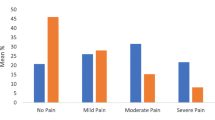Abstract
Objective To identify problems, perceptions and information needs of parents and carers regarding oral chemotherapy. Setting Two Paediatric Oncology Centres in the UK. Methods A semi-structured questionnaire was developed in consultation with professionals working within paediatric oncology. Questionnaires were administered in face-to-face interviews with parents of patients attending clinic appointments. Responses to questions were coded and entered into a database for descriptive and inferential analyses. Responses to open questions were coded using simple thematic analysis whereby codes and themes emerged from the data and were compared and contrasted between respondents. Findings were further validated by quotes from interviewees to open questions. Main outcome measures Awareness and knowledge of medicines, information needs and handling procedures. Results Fifty-five interviews were conducted. Most interviewees viewed oral and intravenous chemotherapy as equally important and potent. Three-quarters of parents were aware of the adverse effects chemotherapy could have on them, worryingly three-quarters of the same group of parents did not use all the handling precaution methods advised by health care professionals. Knowledge of acute lymphoblastic leukaemia maintenance treatment was assessed in 47 interviewees; 31 parents were able to explain the reasons for maintenance chemotherapy. Interviewees felt well informed by the hospital and found it easy to access information they needed. The data suggest the majority of parents had a great interest in understanding the disease and treatment, with 91% using the internet to access further information. Three-quarters of parents faced some kind of difficulty when dealing with oral chemotherapy, including problems with the patient not taking the drug, technical and supply problems and problems following the drug regimen. Self-reported compliance in this study was high with 69.1% of interviewees stating they never forgot a single dose. 72.2% of interviewees used a reminder method, of which 81.6% were written reminders. Conclusion This study highlights that although the support systems offered by the paediatric oncology centres were good, certain areas need improvement, specifically the manner in which parents/carers are educated and informed.
Similar content being viewed by others
References
Relling MV, Hancock ML, Boyett JM, Pui CH, Evans WE. Prognostic importance of 6-mercaptopurine dose intensity in acute lymphoblastic leukemia. Blood 1999;93:2817–23.
Schmiegelow K, Schroeder H, Gustafsson G, Kristinsson J, Glomstein A, Salmi T, et al. Risk of relapse in childhood acute lymphoblastic leukaemia is related to RBC methotrexate and mercaptopurine metabolites during maintenance chemotherapy. Nordic Society for Paediatric Haematology and Oncology. J Clin Oncol 1995;13:345–51.
Smith SD, Rosen D, Trueworthy RC, Lowman JT. A reliable method for evaluation drug compliance in children with cancer. Cancer 1979;43:169–73.
Tebbi CK. Treatment compliance in childhood and adolescence. Cancer 1993;71(10 Suppl.):3441–9.
Tebbi CK, Cummings KM, Zevon MA, Smith L, Richards M, Mallon J. Compliance of paediatric and adolescent cancer patients. Cancer 1986;58:1179–84.
Lennard L, Lilleyman JS. Variable mercaptopurine metabolism and treatment outcomes in childhood lymphoblastic leukaemia. J Clin Oncol 1989;7:1816–23.
Adams M. Information and education across the phases of cancer care. Semin Oncol Nurs 1991;7:105–11.
Bowling A. Research methods in health, 2nd ed. Buckingham: Open University Press; 2002. ISBN 0-335-20643-3.
Davies HA, Lennard L, Lillyman JS. Variable mercaptopurine metabolism in children with leukaemia: a problem of non-compliance? Br Med J 1993;306:1239–40.
Haynes BH, McKibbon KA, Kanani R. Systematic review of randomised trials of interventions to assist patients to follow prescriptions for medications. Lancet 1996;348:383–6.
Acknowledgements
We thank the parents for agreeing to participate in this study and the School of Pharmacy, University of London and Great Ormond Street Hospital for funding.
Conflict of interest
None.
Author information
Authors and Affiliations
Corresponding author
Rights and permissions
About this article
Cite this article
Christiansen, N., Taylor, K.M.G. & Duggan, C. Oral chemotherapy in paediatric oncology in the UK: problems, perceptions and information needs of parents. Pharm World Sci 30, 550–555 (2008). https://doi.org/10.1007/s11096-008-9208-5
Received:
Accepted:
Published:
Issue Date:
DOI: https://doi.org/10.1007/s11096-008-9208-5




